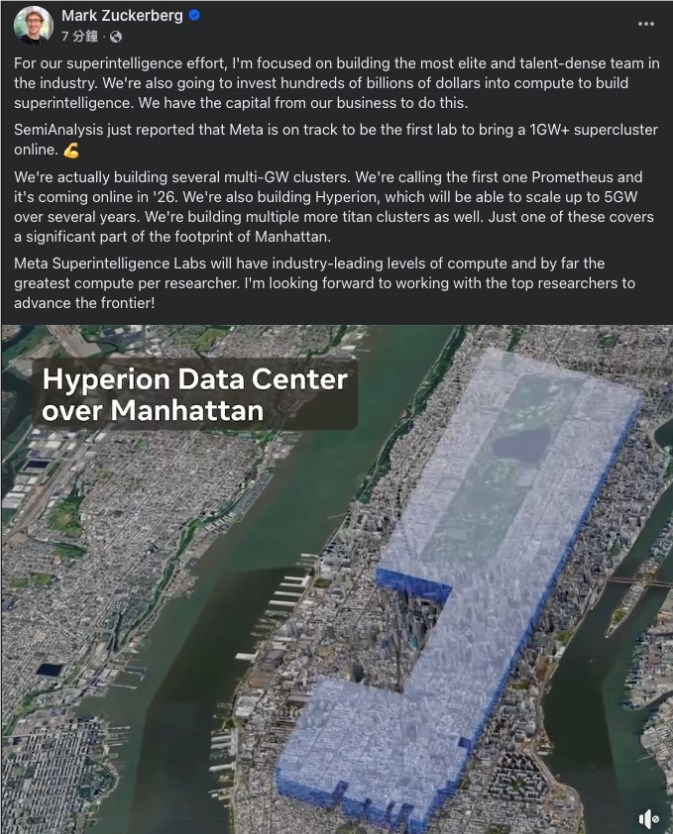Mark Zuckerberg, CEO of Meta, announced through social media that the company is accelerating its artificial intelligence infrastructure efforts and plans to launch the "Prometheus" supercomputer cluster, the world's first with a power consumption exceeding 1 gigawatt (GW), expected to be operational in 2026. At the same time, Meta is also planning another ultra-large-scale cluster called "Hyperion," which will have a power consumption of up to 5 GW in the coming years, comparable in scale to Manhattan.

Prometheus Cluster: A Milestone with Over 1GW Power Consumption
Meta's "Prometheus" supercomputer cluster is positioned as the world's first AI computing infrastructure with a power consumption exceeding 1 gigawatt. According to social media discussions, this cluster will be equipped with approximately 1.3 million NVIDIA H100 GPUs, providing over 2 exaflops of mixed-precision computing power, far surpassing Meta's previous AI Research SuperCluster (RSC) launched in 2022 (approximately 5 exaflops). Prometheus is specifically designed for training the next generation of large language models (such as Llama4) and general artificial intelligence (AGI), aiming to support multimodal AI tasks, including real-time speech translation, augmented reality (AR) applications, and metaverse-related technologies.
Differing from traditional supercomputers, Prometheus uses the NVIDIA Quantum2 InfiniBand network architecture and the Grand Teton hardware platform (a design contributed by Meta to the Open Compute Project OCP), optimizing GPU communication efficiency and data center energy efficiency. On social media, developers expressed astonishment at the scale of Prometheus, calling it "redefining the upper limit of AI computing power."
Hyperion Vision: The Future Blueprint with 5GW Power Consumption
In addition to Prometheus, Meta has also revealed plans for the "Hyperion" cluster, which is expected to consume up to 5 GW of power, with a scale comparable to a small city. This cluster will further expand Meta's AI infrastructure, targeting more complex model training and inference tasks. On social media, analysts pointed out that Hyperion's energy consumption is equivalent to 20 times that of Elon Musk's xAI's 300,000-GPU cluster, showing Meta's aggressive strategy in computing power investment.
The specific details of Hyperion have not been fully disclosed yet, but Meta stated that the cluster will use liquid cooling technology and high-performance network architecture to meet the cooling and communication demands of large-scale AI training. Furthermore, Meta plans to invest between $6 billion and $6.5 billion in 2025 for data center construction and expansion of the AI team, ensuring synchronized growth in computing power and talent reserves.
Industry Background: The Intensifying AI Computing Race
Meta's 1GW+ cluster plan comes at a time when the global AI computing race is intensifying. In 2022, when Meta launched RSC, its 16,000 NVIDIA A100 GPUs already placed it among the fastest AI supercomputers in the world. Now, the planning of Prometheus and Hyperion further elevates Meta's position in the AI infrastructure field, directly challenging competitors such as OpenAI, xAI, Google, and Microsoft.
Social media feedback shows that industry professionals have mixed opinions on Meta's strategy. Supporters believe that the 1GW+ cluster will provide strong support for Meta's Llama series models and metaverse ecosystem, possibly promoting the further development of the open-source AI ecosystem; critics, however, worry that such high-energy computing infrastructure might exacerbate energy consumption and environmental pressure.
At the same time, Meta's competitors are also increasing their investments in computing power. For example, xAI recently announced that its Memphis supercomputer cluster (about 300,000 GPUs) consumes 200-300 megawatts, while Microsoft and OpenAI's Stargate project plans to invest over $50 billion in building AI data centers. Meta's 1GW+ cluster is undoubtedly a direct response to these projects.
Technology and Ecosystem: Emphasizing Open Source and Privacy
Meta emphasized that Prometheus and Hyperion will continue its commitment to open computing (Open Compute Project) and open-source ecosystems such as PyTorch. The cluster design is based on the Grand Teton platform, supporting both RoCE and InfiniBand network architectures, showcasing Meta's exploration in hardware flexibility and scalability. Additionally, Meta promised strict measures for data privacy, stating that the cluster will be isolated from the internet, with all data transmission encrypted to protect user data security.
On social media, developers welcomed Meta's open-source strategy, believing it will further lower the barriers to AI development. However, some users pointed out that such a large-scale computing deployment may require more transparent reports on energy usage and carbon emissions to respond to public concerns about sustainability.
From the perspective of AIbase, Meta's 1GW+ supercomputer cluster plan is not only a technological breakthrough, but also a key step in its strategic layout in the AI and metaverse fields. The launch of Prometheus and Hyperion will significantly enhance Meta's competitiveness in large model training and multimodal AI applications, possibly making Llama4 the leading open-source model in 2025. However, the pressure from high energy consumption on the environment and operational costs, as well as the intense competition with rivals like xAI and OpenAI, will test Meta's execution capabilities and resource integration ability.
Additionally, Meta needs to balance the expectations of the open-source community with commercial goals, ensuring that its computing power investment can be transformed into actual product innovation and user value. AIbase will continue to monitor the progress of Meta's cluster construction and its impact on the global AI ecosystem.
To experience Meta's AI technology, visit Meta AI's official website (https://ai.facebook.com) or follow its social media updates. For further information on Prometheus and Hyperion, refer to Meta Engineering Blog (https://engineering.fb.com) or the Open Compute Project website.
